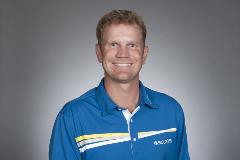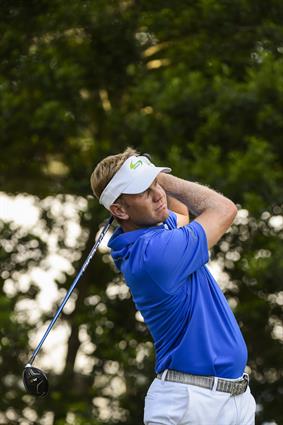This story appears in FCA Magazine’s May/June 2017 issue. Subscribe today!

Born: June 9, 1982
Birthplace: Leesburg, Virginia
Family: Billy married his wife, Heather, in 2005. They live in the Annapolis, Maryland, area with their three children: Will (Willard Jeremiah Hurley IV), Jacob and Madison.
College: United States Naval Academy, B.S. Quantitative Economics, 2004
Turned Pro: 2006
On The Course: Billy and his caddie, Clay Duerson, first connected in 2011 at an FCA Bible study on the Nationwide Tour. They had played a practice round that week, and Duerson began working for Billy a few weeks later in mid-2011.
Off The Course: On Oct. 4, 2016, Billy attended Arnold Palmer’s memorial service in Latrobe, Penn-sylvania, and still made it back to Annapolis for an FCA Fields of Faith event. “He’s committed, and he follows through,” Navy FCA Campus Director Kirby Myers said.
Online: Keep up with Billy Hurley III on his website BillyHurley3.com, on Facebook (/BillyHurleyIII), on Twitter
(@BillyHurley3), and on Instagram
(@BillyHurley3)
“And let the peace that comes from Christ rule in your hearts.”
– Colossians 3:15a
My parents might not have made it through the early years of marriage if not for my dad working at a golf course in Reston, Virginia. The locker room attendant was a guy named Mike Minter, and he was the evangelist of the place. He probably saved the whole golf shop.
My dad, Bill, made a decision for Christ and brought faith to our family. I say jokingly that he and my mom, Cheryl, brought my three siblings and me up with no other real option. We were raised in church.
There was a lot of Awana. I thrived there. It was great for my personality type. Memorizing Scripture was pretty easy and enjoyable, and the games were right up my alley. You could ask any of my Awana leaders how competitive I was, even back at 8, 10, 12 years old.
As I grew older, life revolved around sports. We’d run around from sport to sport, especially in middle school. I remember going to youth group, and the other kids were talking about things like lying to their parents. Those types of things didn’t really compute with me, so I dropped out. I didn’t feel like I was missing out on anything, because I still went to “big” church with my parents. So I definitely had the intellectual side. I knew the Bible and had all the right answers. As a result, my faith journey since then has ultimately been about getting my faith from my head to my heart.
• • •
I only applied to one college: The Naval Academy. There were no backup options.
Fortunately, I got in.
During those four years, my personal growth was astronomical, in terms of character and leadership development. Spiritually, it was more flat. I didn’t go to church much because we traveled every weekend for golf tournaments. In fact, I didn’t have much time for anything but golf, school and homework. I certainly didn’t run from faith or turn my back on anything. I just kind of existed.
I graduated in 2004, and about a year later I married my wife, Heather. I was teaching economics at the Academy, and we finally found a church and joined a married couples group. Pete Hiskey, one of the leaders, has since become one of my mentors.
We were a young couple and starting a family, and Heather challenged me to lead well as a husband. To do that, I had to continue to dive deep into my relationship with God.
From the Trinity standpoint, I connected with God the Father. That’s easy—who He is and the order of everything He put together. I always had a much harder time connecting with the person of Jesus. Intellectually, I fully comprehended what He did for me. But I grew up fairly unemotional, and the Navy certainly doesn’t help develop that side of you. I needed to connect with Jesus, and my life since those early years of marriage has allowed me to understand Him more deeply and the compassion and love available through a relationship with Him.
• • •
After completing my five-year active duty service in the United States Navy, we returned to Annapolis in 2009 so I could focus full-time on pursuing a golf career. My dad was a very good player, and he was as excited about my pursuit as I was—maybe sometimes more.

"I have to remind myself all the time that God’s plan is better than mine."
-Billy Hurley III
Professional golf is one of the truest meritocracies in the world. There is no subjectivity. No long-term contracts. No 10-year, $180-million deals. It’s 100-percent performance-based, and—even after you’ve “made it”—you can’t slip.
With few exceptions, golfers don’t walk onto the PGA Tour immediately. I was not an exception. I had to earn my way onto the Tour three times. In 2011, I finished 25th on the Nationwide Tour to claim the final automatic spot on the PGA Tour for the next season. As a Tour rookie in 2012, I finished 151st in the money rankings; only the top 150 get to come back.
My family and I got very used to living on the bubble.
I have to remind myself all the time that God’s plan is better than mine. That was never on display more than 2014, when I returned to the PGA Tour. I had a career-high four top-10 finishes and was comfortably inside the top 100 on the money list.
It was hard not to feel like I’d “made it.” Then came 2015.
• • •
I missed the cut in 10 of my first 16 events in 2015. When you miss the cut, you don’t make any money and don’t collect any points toward the year-long standings.
I started putting together some decent results during the summer and was set to play in the Quicken Loans National, a tournament near where I grew up that has strong ties to the armed forces. It’s special to our family.
The Monday before play started, I got word that my dad was missing. He had left Virginia without telling anyone. During media interviews, I pleaded for information on his whereabouts. The story soon transformed from golf news to national news.
I waited.
After finishing my round on Friday, I was told my dad has been spotted near Texarkana, Texas. He’d been telling everyone who spoke to him, including a police officer and investigators, that he was traveling. He hadn’t done anything wrong, so the police couldn’t hold him.
Two weeks later, he was found dead. He had committed suicide.
When something inexplicable like suicide happens, you ask, “What happened? How does that work? And why?” Lots of whys. Not that my dad was perfect, but this was certainly nothing you ever saw coming or expected out of him. As the oldest son, I felt the burden to take care of my family. I’m action-oriented, so in the immediate aftermath I went into a mode of, “This is what we need to do.” Get life organized.
It wasn’t until probably three or four months later that I actually started to cope with the loss. I don’t know how else to say it, but you just go on. From a faith perspective, it was challenging.
.tmb-medium.jpg?Culture=en&sfvrsn=20bcb87a_1) Coincidentally, I had already been in therapy for a couple years—me working on me. My caddie, Clay Duerson, had said, “You just get too mad at times, and I don’t want anyone to see an 11-second clip of Billy Hurley and think, ‘That’s who he is.’” The work I had done previously in therapy made it somewhat easier to deal with my dad’s death.
Coincidentally, I had already been in therapy for a couple years—me working on me. My caddie, Clay Duerson, had said, “You just get too mad at times, and I don’t want anyone to see an 11-second clip of Billy Hurley and think, ‘That’s who he is.’” The work I had done previously in therapy made it somewhat easier to deal with my dad’s death.
In unexpected situations, you just have to decide you’re going to trust Him. The idea of God working my father’s suicide together for good, as Romans says, was very difficult. It’s still weird. The event itself is obviously not good, but with the way things have gone since—at least for my family and me—I can see things come out of it that are good.
I scraped my way back onto the PGA Tour in 2016. Through the first half of the year, my results had been mediocre, and then I returned to the Quicken Loans National one year after everything happened.
I played well and won, and everything—my standing on the PGA Tour to my perspective on the previous year—changed.
Winning made it seem OK to celebrate my dad’s life. With suicide, so much of the focus is on how my dad died rather than the life he lived. I hate that winning is what changed it for me, because winning doesn’t solve things and it begs the question, “What would have happened if I didn’t win?” But it was like turning on a dime inside of me.
This year, Clay and I have been praying as we walk down the first fairway of every round. We pray that we would glorify God, play without fear, play with peace. Most importantly, we just invite Him to be with us.
I’ve been given a platform, and I have this story that connects with people, and maybe it opens more eyes and hearts. That includes my own heart, and God’s still working on mine.
-FCA-
Photos courtesy of Getty Images and the US PGA Tour